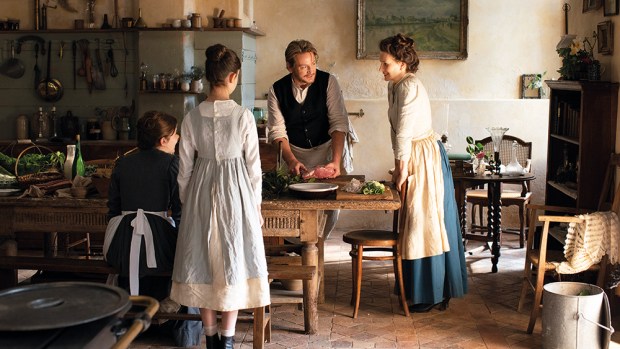Before we turn our attention to Florence Foster Jenkins — but if you can’t wait, it’s so-so — I feel I should address the several hundred (and counting; hell’s bells) comments below my negative review of Captain America: Civil War last week, and the many pleas that I should ‘get a life!’, which seemed a bit rich. Indeed, as I’m not the one overly invested in a film franchise where the films are barely films, just noisy assemblages of CGI set pieces, am I the one most in need of this ‘life’ being talked about? And now I hope to put this argument to bed, otherwise 1) we’ll be here for ever and poor Florence won’t get a look in and 2) as a person whose ‘opinian’ doesn’t matter and who was plainly ‘biast’ I feel I’ve already experienced enough adventures in spelling to last a lifetime, and therefore don’t wish to kick it all off again.
And now on to Florence. This is based on the rich, real-life 1940s New York socialite who fancied herself as a gifted singer whereas, in truth, she was appalling. Rupert Christiansen has detailed her life on page 42, so I refer you to that, rather than repeat everything here. I will say only that I’ve listened to the original recordings, as available on YouTube, and her Queen of the Night aria may be the worst sound I have ever heard aside, perhaps, from foxes having sex in the middle of the night. It may even be that foxes having sex in the middle of the night are more tuneful. Why didn’t she know? It’s possible there is no answer to that, given the delusional nature of delusions, but I do wish this film had asked anyhow.
It’s directed by Stephen Frears, who has had his highs (My Beautiful Laundrette, Dangerous Liaisons, Dirty Pretty Things, The Queen, Philomena) and his lows (Tamara Drewe, Mrs Henderson Presents) and this is neither high nor low but a middling one, taking its place alongside The Program, say. It gets us from A to B. It does the job. It’s not a trip to the cinema you’ll bitterly resent, as can happen when, for example, it’s just hours and hours of one thing smashing into another thing. But it can never quite decide whether it wants to be comic or tragic, whether it wants us to laugh at or with, and in fully committing to neither, it often lapses into sentimentality of the most cloying kind.
Meryl Streep, at her most winsome, stars as Florence, who is certainly introduced comically. Here she is, a vision in chiffon and angel-wings, being lowered stutteringly from the ceiling as part of a variety show performed for the Verdi Club, an organisation of her own founding. In attendance is St Clair Bayfield (Hugh Grant, at his most Hugh Grant-ish, which is strangely touching these days), a failed Shakespearean actor who is also her common-law husband and who, if you go by this, is entirely devoted. His job is to protect her from derision while keeping her dream alive, but I kept thinking: if he truly loved her, wouldn’t the kindest thing have been to pull her aside and say simply ‘No, Flo. No’? I just never understood his motivation. At all.
It then continues comically. Florence decides she wants to put on a solo singing performance so Bayfield gets to it, hiring a vocal coach from the Metropolitan Opera (David Haig) who fawns all over Florence for her money, and isn’t about to say anything, and a naïve young pianist, Cosmé McMoon (Simon Helberg). This sets the film up for the best and funniest scene, when Florence starts to sing and McMoon first hears her voice. He’s like a trapped animal. His eyes register fear, panic, bafflement. It’s hilarious, but once Frears has had his big reveal there’s nowhere else to go, and the sentimentality starts to pile up.
Many scenes are included simply to build our sympathy. For example, at one point Florence pays a surprise visit to McMoon in his apartment. The visit serves no purpose except that, as she’s doing his washing up, she starts to tell him something of her life — her cruel father; the first husband who gave her syphilis. But it isn’t moving because it feels so heavy-handed, as if it’s been jetted in solely for this reason, rather than forming a natural part of the narrative. Many other questions also go unanswered. Did she know Bayfield had another woman on the go? If audiences love Florence because she is terrible, does that delegitimise their enjoyment? So it is ultimately unsatisfying, as a psychological profile and otherwise. But that is just my ‘opinian’.
Got something to add? Join the discussion and comment below.
Get 10 issues for just $10
Subscribe to The Spectator Australia today for the next 10 magazine issues, plus full online access, for just $10.
You might disagree with half of it, but you’ll enjoy reading all of it. Try your first month for free, then just $2 a week for the remainder of your first year.













Comments
Don't miss out
Join the conversation with other Spectator Australia readers. Subscribe to leave a comment.
SUBSCRIBEAlready a subscriber? Log in